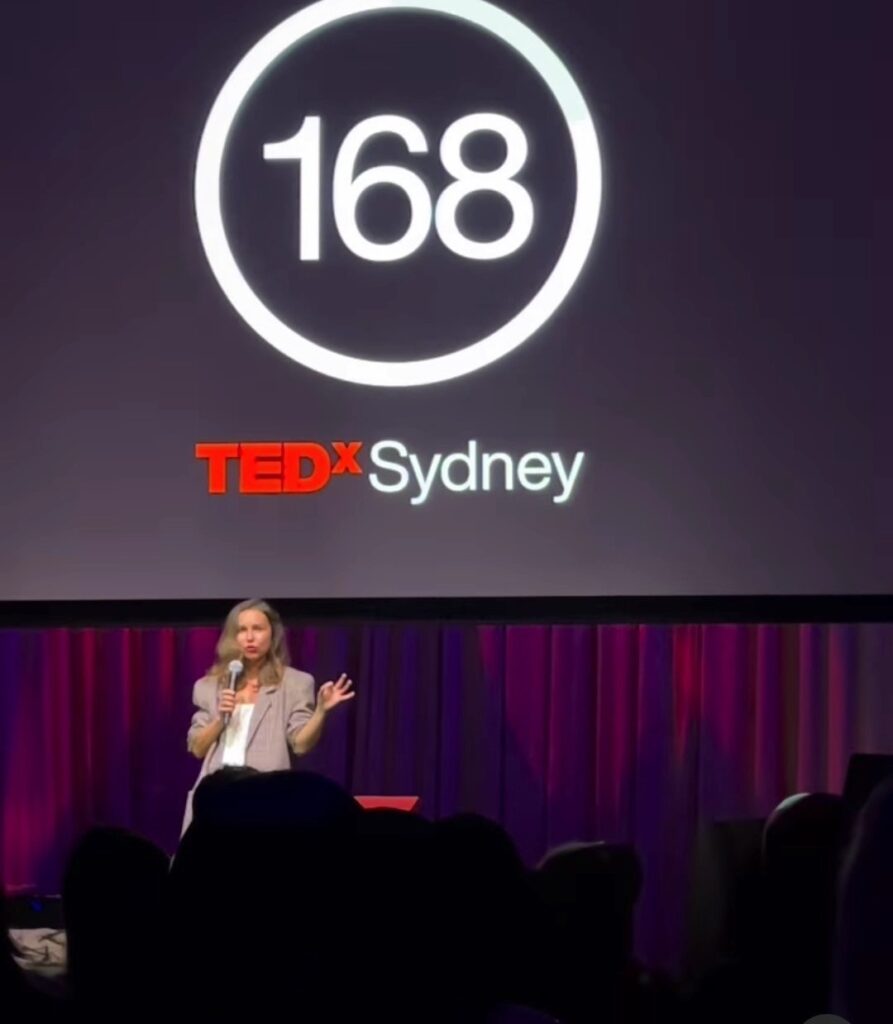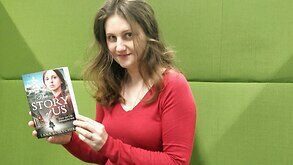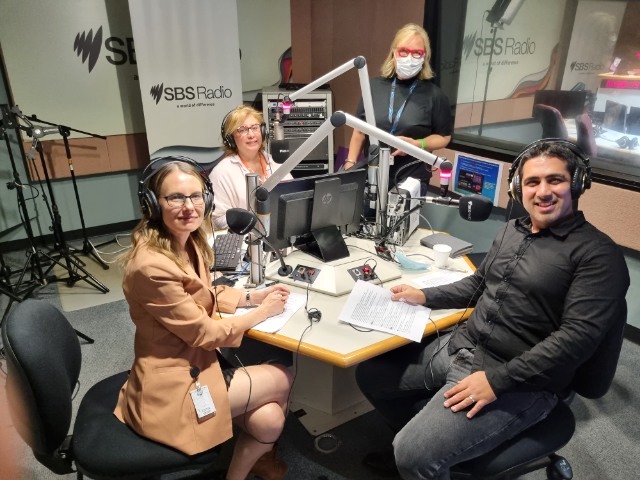The stories of migrants in Australia who managed to subdue the defiant English language
On the eve of the federal election, I was chosen as one of three SBS Radio journalists to
record a telephone interview with the now former Australian Prime Minister Scott
Morrison. The main thing I was worried about was my English, which is my second
language. I was imagining a long pause after my question, then the PM asks me to repeat
it, my accent gets even stronger from fear, Mr Morrison doesn’t understand me again and
I repeat my question ten thousand times, burning with shame. Or, even worse, I get
confused with pronunciation and, for example, instead of “ship” I’d say “sheep”. Although
the interview was not meant to be about either ships or sheep, I was already saying
goodbye to my career in the media.
After my mum had listened to the interview, she texted me only one phrase: “Well, you
still have a long way to work on your accent.” This remark hit me hard and I thought that
all of us, migrant adults who hadn’t learnt English in school and started a new language
learning process in our 30s, are probably doomed to fail. Or is there still hope of getting to
the end of this road where you can say “My English is perfect”?
What do scientists say?
Scientists are even more ruthless than my mother. According to the Critical Period
Hypothesis, we’re genetically programmed to acquire specific skills at specific times in
our lives. And outside of these critical periods, it’s either difficult or impossible to master
some abilities. As for language acquisition, we should do it in early childhood because as
we get older our hearing becomes less tuned, our brain loses its plasticity, and after
puberty getting rid of an accent is just out of the question.
Even though P Lightbowe and N Spada, the authors of well-known textbook How
Languages are Learned, note that older language learners are often more effective at
learning due to their metalinguistic knowledge, memory strategies, and problem-solving
skills, they also write about evidence that in immigrant families children
quickly begin to speak a new language with the fluency of a native speaker while their
parents are far behind in language proficiency.
Married or Murdered?
“In Australia lots of people speak with accents and there’s nothing to be ashamed of,”
Elena Yakovleva, an English as a second language teacher from Sydney, says. “But we must try to make our speech as clear as possible. If people understand you, the goal of communication is achieved.”

Yakovleva studied English in school and spoke it fluently when moving to Australia from Russia, while her husband had to learn a new language in his 30s. When she saw him rehearsing a few phrases before a job interview and stumbling over the same words every time, she recorded audio where she slowly and clearly pronounced all the words of each sentence, pausing after 2-3 words so he could repeat them. Her husband liked this
technique and asked her to record more phrases for him. “Why only for him?” she
thought and started a Telegram channel for all English learners.
“When you start learning a new language it can be difficult to note the difference between
words like “quiet” and “quite”. But when you get it, your speech becomes clearer. I
remember my student from Brazil was telling me with a huge smile that her sister had
been murdered. Seeing from her facial expression that this was clearly not a tragic story, I
asked her to explain what she meant. It turned out that she simply couldn’t distinguish
between the words ‘murdered’ and ‘married’ by ear.”
Yakovleva says that thanks to her own experience in learning a second language, she can
better understand the problems her students face, and considers this her main
advantage over native English-speaking teachers.
Famous American linguist and researcher Stephen D Krashen also notes how important it is for a foreign language teacher to speak at least two languages. The ESL (English as a second language) industry in Australia was founded largely with the help of migrant English teachers as they knew and could explain grammar better than many Australians. In the 1960s, the structured teaching of English grammar was taken off the Australian curriculum, and many people left school without any knowledge of it.
Another ESL teacher, John Miskaryan, who taught English for many years at Sydney
Cambridge College, says that as a person who studied English for a long time,
he finds it easier to understand students.
“For example, my colleague comes to me and complains that she had already explained
the concept of present-perfect five times, but her student still didn’t understand. And it’s
difficult for her to realise these students don’t have such verb tense in their native
language at all; the concept is new to them. Native speakers are unrivalled in teaching
pronunciation or explaining local slang.
“But when it comes to the basics of English, a teacher with a language learning experience is like an anatomist who looks at the language as an object of study and can easily explain it to a student.”
“If you want to learn how to play the harp, you must play the harp.”
The stories of these teachers, who remained in a teaching profession after
relocating to an English-speaking country and consider themselves better specialists than some locals, are impressive. But they came to Australia already knowing English. They didn’t have to experience all shades of shame like I had, when shortly after moving
to Australia I went to buy an iPhone and couldn’t understand two simple words the shop assistant repeated several times with a condescending smile: “Black or white?”
Finally I pointed my finger at black, having lost all the joy of owning my first iPhone
somewhere between his third and fourth repetition.
“Okay, I’m an English teacher in Australia and I was an IT specialist in Russia. I moved to
Australia at 54.” This is another interlocutor Oleg Vainberg, a 57-year-old teacher from
Brisbane. I’m speaking to him shortly after my long-suffering interview with the PM, and
his confidence is exactly what I need right now.
Vainberg tells me that after moving to Australia he started AMEP (Adult Migrant
English Program) courses. During his studies he noticed there was always an assistant in class helping a teacher. Gathering his courage, he knocked on the door of the college
administration.
“I asked in my rusty English if they could give me this job. My boldness surprised them,
but they gave me a form to fill out,” he says. “There was a question about countries I have
visited. I listed just half of them and ran out of space on the paper. The administrator was
very surprised and asked if I had really been to all these countries. I think this played a
key role because they realised that I had experience of interaction with different
cultures, which is highly valued in working with migrants.”
He was given a volunteer position and for several months was a student in the morning classes and a volunteer assistant in the evenings. He remembers how insanely afraid he was at first not understanding requests of the teacher, but gradually it became easier for him to communicate in English.
“If you want to learn how to play the harp, you have to play the harp,” he says. “If you
want to learn how to speak English, speak it every day.”
A few months later, after he had received a trainer and assessor certificate
and a TESOL certificate, he applied for a paid position and got it.
“In our class from the very beginning I noticed two types of migrants. Some said that
since English is not their native language, it’s almost impossible to learn it at a sufficient
level, and the only jobs that are available for migrants are in Childcare or Coles. The
second group reasoned as follows: Australia is very lucky because we came here, we’ll
bring a lot of benefits, we’ll pay good taxes, we’re great professionals. And the fact that
our English is not very good wouldn’t stop us. We speak with mistakes, but who doesn’t
make them.”
Vainberg concludes: “People from this second group found jobs either during the course or immediately after. Many people from the first group are still looking for a job.”
It seems logical that sociability, openness and determination will lead to success.
I ask Oleg, who comes across as a super-open and sociable person, about
those who consider themselves introverts.
“And who told you that I’m not an introvert?” he asks. “I was an IT specialist all my life,
and you know these people are not exactly the social sort. I didn’t say that I love to
communicate, but I said that I can do it. It’s a skill anyone can master.”
Pap smear for men and five types of sharks

“I think migrants can’t afford to be introverts,” Anastasia Koryukin says. She is an
author of a new methodology for learning English through Instagram stories which she
recently presented at the TED conference in Sydney.
“How can we not love small talk? We have to do it! There is such a myth that you move to
an English-speaking country and English starts coming to you from everywhere. It doesn’t
happen that way. Learning English is an effort. It’s easier to remain silent on the sidelines,
but you need to get out of your comfort zone and talk to people.”
I’m listening to her and thinking this was exactly what I did after moving to Australia.
Completing an Elementary English course, I got a job as a receptionist in a small
medical centre in Waterloo. Every morning I went to work in a state of panic, my heart sinking at every phone call. I wanted to quit so many times but I didn’t. I have a few hilarious anecdotes from that time which then of course didn’t seem so funny.
Once a young woman and a man came into the clinic and the woman told me she had an
appointment for a pap smear. Not knowing what pap smear meant I nodded solemnly
and turned to the man and asked, “Are you also here for pap smear?”. When I later found
out why his eyes became so big, I hoped I would never see them again.
I know every language learner has many such stories. The question is how after all
these mistakes can one keep talking?
“We should remember that we may not understand or know some things, not even
because our first language is not English, but because this is a new country and a new
culture,” Koryukin tells me.
“Once I went with my Canadian friend for a Quiz Night in Sydney. This is just a monstrous
event for those who were not born and raised in this country. ‘Name six types of sharks’,
the host cheerfully asks, and while you’re trying to digest the information that there ARE
different sharks, people are shouting their answers. The next question: ‘In what year
was the Rugby World Cup in Sydney?’ My Canadian friend and I just have no
idea. And I remind you that she speaks excellent English; it’s her native language.”
But what if a language is your main tool?
Journalists, teachers, lawyers – people of such professions when migrating to a country
with the language they don’t speak lose their main tool with which they earn a living. And
they need to use this tool not just at an average level, but to be a virtuoso, feel
the language deeply. But how to be a virtuoso in a language whose words have not had
time to connect with your feelings and emotions? After all, our beloved scientists say that
by learning a new language we acquire a new personality. A lot of time is needed for this personality to mature.

“You have to give yourself time,” Lana Kortchik, a writer from Sydney, starts her
inspiring story. Before immigrating to Australia she always wrote novellas and poetry, but
here she started to work as an IT engineer. For years she was learning English, but didn’t
beat herself up for not resuming writing. Then she went to study History, where the
teacher praised her for her creative essays.
“The very next day I sat down and wrote my first story in English,” Kortchik says. “It was
published in the magazine AltHistory. Then there were kids’ stories. And then I wrote my
first book.”
For a year, she emailed the manuscript to various publications, receiving hundreds of
rejections. Then she signed a contract with a fraudulent agency that simply put her book
on Amazon and took the money. But she began to receive the first reviews from
readers.
“I remember standing in line for coffee on my way to work and reading feedback from a
woman who said she hadn’t slept in two nights reading my book. I cried with happiness
that someone liked my book so much that they didn’t even sleep at night.”
Then agency went bankrupt and Kortchik got all the rights to her book back. She decided to send the manuscript for the last time, determined not to experience all the rejections again. She sent it to her favourite agency HarperCollins.
Right now I’m holding a book, The Story of Us, by Lana Kortchik, published by HarperCollins, thinking that maybe there is no such final stop as “perfect English” but only an interesting journey filled with small and big achievements, including interviews with the country’s top politician.


